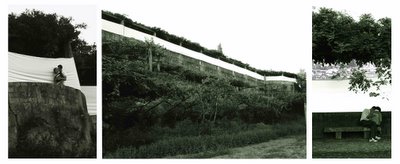Here is a project I participated in a short while ago:
 The Logical Picture of the Facts is the Thought
The Logical Picture of the Facts is the Thought, group project (by artLAB) (2005)
The inhabitants of the city of Penafiel, Portugal, were temporarily deprived of their most beautiful landscape. The entire Lovers’ Garden vista point was covered by 150m of white canvas, creating a border between the scenery and the park. The onlookers’ immediate reaction was a decision on their own place in the landscape.
The vista point separates the public space of The Lovers’ Garden from private vineyards. The visitors faced a choice: either stay in the public park without the scenic landscape, enjoying the new cosiness created by the canvas, or go behind the canvas and rediscover the view, but as a private, intimate experience. Then, the visual isolation from the nearest surroundings gave the panorama an unexpected closeness.

This collective work was the fruit of an artistic residence and workshop around “New Ways of Approaching Landscape”. The basis was research done on the relationship between the city dwellers and their most beloved panoramic viewpoint.

The picturesque wine hills are also next to the city center, making them a target for real estate development. Several areas are soon to be transformed into cheap housing blocks. The Logical Picture… is a reaction to this situation. It presents the landscape as a prohibited fruit, a “thought-provoking picture”.
(And I must tell you, rarely have I seen people react like that to a work. It made us feel good.)

This initiative was created by artLAB*projectos in September 2005, with the support of the City of Penafiel, the Caixa Geral de Depósitos bank and the Superior Institute of Agronomy (Universidade Técnica de Lisboa)
----
Of course, the first superficial reaction is - it's pretty close to what Christo does. Which, in my humble opinion, is false. It does take up a similar language, but uses it in a distinct manner. The idea is not a "package", nor a "fence". And it is very distant from the modernist "art for art's sake" approach that is at the core of Christo and Jeanne-Claude's work. Here, a clearly social work was made. A "public" work in a meaning I like to use.
The long title, a quote from Wittgenstein, makes it clear - we want you to think, not just leave the work as a "neutral" fact.

 The Logical Picture of the Facts is the Thought, group project (by artLAB) (2005)
The Logical Picture of the Facts is the Thought, group project (by artLAB) (2005)




0 comments:
Post a Comment